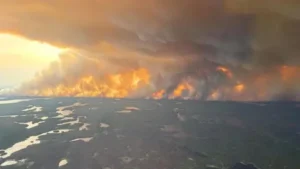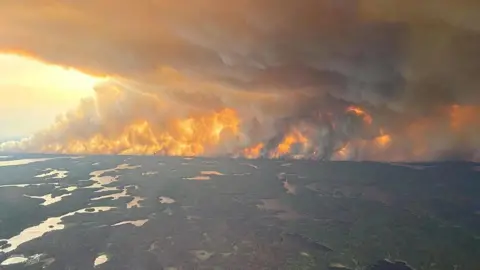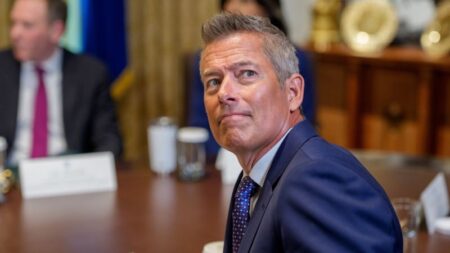In a recent development, six members of the United States Congress expressed their concerns regarding the adverse effects of Canadian wildfire smoke on American summer activities. In a heartfelt letter directed to Canadian Ambassador Kirsten Hillman, the lawmakers highlighted how the suffocating smoke has significantly impacted the well-being of their constituents, discouraging them from enjoying outdoor summer activities to the fullest. This correspondence has reignited discussions about the cross-border implications of climate-induced disasters, as well as the urgent need for preventive measures concerning wildfires.
The signatories of this letter include Congressmen Tom Tiffany and Glenn Grothman of Wisconsin, along with their Minnesota counterparts—Michelle Fischbach, Brad Finstad, Pete Stauber, and Tom Emmer. Within the letter, the lawmakers clearly communicated the distress caused by the smoke permeating into the United States, limiting safe outdoor recreation during a season typically seen as a time for family gatherings and enjoying nature. “Our constituents have been limited in their ability to go outside and safely breathe due to the dangerous air quality the wildfire smoke has created,” they stated, underscoring the immediacy of the issue at hand.
Tom Emmer, who plays a pivotal role as the Majority Whip in the House of Representatives, took a lead in pressing for answers. The letter inquired directly about the measures Canada intends to implement to alleviate the wildfire threats and address the resulting air quality issues. In a response to the concerns raised, Canadian embassy spokesperson Tarryn Elliott assured that the Canadian government takes wildfire prevention and management very seriously. Elliott confirmed that the letter was received and would be disseminated to the appropriate government agencies for further action.
Canada has experienced a grim wildfire season since the beginning of 2025, with two fatalities reported and thousands of residents forced to evacuate their homes. The wildfires, by this point, had already produced significant destruction, leading to emergency declarations in several provinces, including Saskatchewan and Manitoba. May and June were particularly catastrophic, resulting in the evacuation of approximately 30,000 individuals, underscoring the grim reality many Canadians are facing.
The lawmakers made reference to the ongoing nature of these events, stating, “As I’m sure you know, this is not the first year Canadian wildfire smoke has been an issue,” while attributing the problem partly to what they deemed as a lack of proactive forest management. They further pointed out that technological advancements in both prevention and firefighting could counteract this troubling trend if applied correctly.
Wildfires, while part of the natural ecological process, have become more frequent and severe, exacerbated by climate change factors that disproportionately impact Canada. According to scientists, data indicates that wildfires in Canada are increasingly becoming a year-round concern, fueled mostly by lightning strikes—a factor that accounted for 93% of the wildfires in 2023.
Climate models show that Canada is experiencing an accelerated warming rate, at twice the global average, and the Arctic region is warming three times faster. This distorted climate trajectory underlines the vulnerability of the country’s natural landscapes, particularly its vast boreal forests, where wildfires play a vital role in regeneration. However, the stark reality is that both the Canadian government and the international community must find a balance between natural ecological processes and the dire human and economic impacts caused by such disasters.
In conclusion, the correspondence from the U.S. lawmakers illustrates the broader implications of climate-related disasters, emphasizing the need for robust cross-border cooperation on environmental management. The ongoing situation necessitates a shared commitment from both countries to implement effective wildfire prevention strategies while addressing the pressing concerns of air quality and health impacts among their citizens. As this crisis unfolds, it is clear that a collaborative approach is essential in tackling the challenges posed by climate change and its far-reaching effects.











